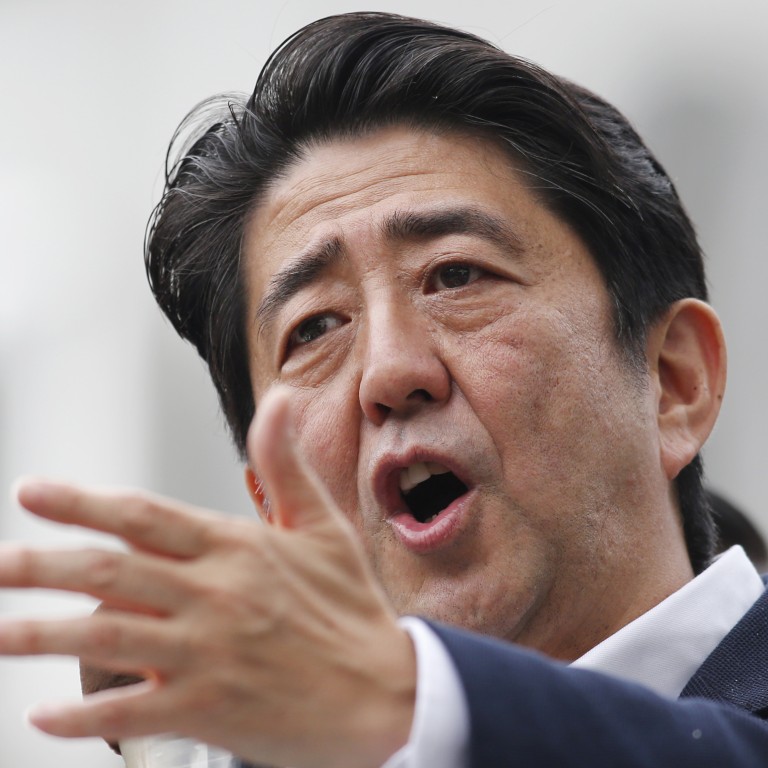
Update | Japan’s Abe faces setback as anti-US-base Okinawa mayor gets elected
A Japanese mayor who opposes moving a US military base to his city in Okinawa won a hard-fought re-election battle yesterday, dealing a potential blow to hopes in Washington and Tokyo that the long-delayed plan would move forward.
A city mayor opposed to a plan to relocate a controversial US airbase on Japan’s Okinawa island was re-elected in a hard-fought poll on Sunday, Kyodo news agency said, creating a political headache for Prime Minister Shinzo Abe and threatening friction with Washington.
 |
| The Futenma base in Ginowan on southern Japanese islands of Okinawa. Photo: AP |
Delays in relocating the US Marines’ Futenma air base, a move first agreed between Tokyo and Washington in 1996, have long been an irritant in US-Japan ties and Abe is keen to make progress on the project as he seeks tighter ties with the United States in the face of an assertive China.
Abe’s ties with Washington suffered after the United States expressed “disappointment” with his December 26 visit to Yasukuni Shrine, a pilgrimage that further strained relations with China and South Korea, which see the Tokyo shrine to Japan’s war dead as a symbol of the country’s past militarism.
Susumu Inamine, a staunch opponent of the relocation plan, was assured re-election as mayor of the Okinawa city of Nago, Kyodo said, citing projections shortly after the polls closed.
Inamine, who vowed to block construction of the base by denying permits for the project, declared victory on Sunday night before 500 supporters at his campaign headquarters. Inamine got 19,839 votes, versus pro-base challenger Bunshin Suematsu, who received 15,684.
Inamine has pledged to use his local authority block the relocation of the functions of Futenma from a populous part of central Okinawa to Nago’s coastal Henoko area. Many Okinawans want the base off their island completely.
His main opponent had backed the plan and ran with strong support from Abe’s Liberal Democratic Party (LDP).
But the plan got a boost last month when Okinawa Governor Hirokazu Nakaima gave the go-ahead for land reclamation to build the new base, whose runways would extend over water from the US military’s existing Camp Schwab. Opponents filed a lawsuit last week seeking to invalidate the governor’s approval.
The proposed move is part of a broader plan to consolidate and reduce the US military presence in Okinawa, currently home to about half of the American troops in Japan.
Inamine’s victory will make it more difficult to move forward, analysts said.
“I don’t think it’ll be easy now for the US base to be relocated, but I think there is a limit to what a local mayor can do,” said Toshiyuki Shikata, a former Japanese military officer and professor of political science at Teikyo University in Tokyo.
 |
| Susumo Inamine declared victory as Nago city mayor. Photo: AFP |
Political analysts said Inamine’s win, while likely to slow progress, might not be a death knell for the relocation plan.
“Mr Inamine says he is totally opposed and may create obstacles, but the Abe government is trying hard to keep its promise to the United States,” Seiichi Eto, an LDP lawmaker and aide to Abe, said late last week.
Analysts say Abe could risk denting voter support for his government, which came to power at the end of 2012 with promises to revive the economy, if he does push ahead with the relocation of the base in the face of local opposition.
Despite all the efforts, the Liberal Democratic Party has lost. I think it reflects how strongly people are opposed to a base relocation
“Inamine’s victory will give momentum to the anti-base movement and the opposition campaign could spread,” Takashi Kawakami, a professor at Takushoku University, said. “Abe will probably try to forge ahead but there will probably be an opposition movement ... and if this is reported in the media daily, Abe’s support rates could fall.”
Futenma has long been a lightning rod for discontent among Okinawa residents, many of whom associate the concentration of US bases with accidents, pollution and crime such as the 1995 rape of a Japanese schoolgirl by three US servicemen.
Seeking to soothe discontent, Abe’s government earmarked 348 billion yen (HK$26 billion) for Okinawa’s economic development in the draft budget for the year from April and pledged about 300 billion yen per year through 2021-22.
Abe also promised to study whether the relocation plan could be speeded up and said the government would start talks with the United States on a deal that could allow for more oversight of environmental issues at US bases.
Pre-election opinion polls by Okinawa media showed about 84 per cent of Nago residents opposed moving the base to Henoko. The ruling LDP wooed voters with promises of additional development funds for the city.
“Despite all the efforts, the Liberal Democratic Party has lost,” said Koichi Nakano, professor of political science at Sophia University in Tokyo. “I think it reflects how strongly people are opposed to a base relocation."
Before the vote, Hitoshi Morine, a spokesman for the Japanese Defence Ministry in Okinawa, said the government would seek bids soon for drilling surveys of the seafloor bedrock to begin designing the base.
